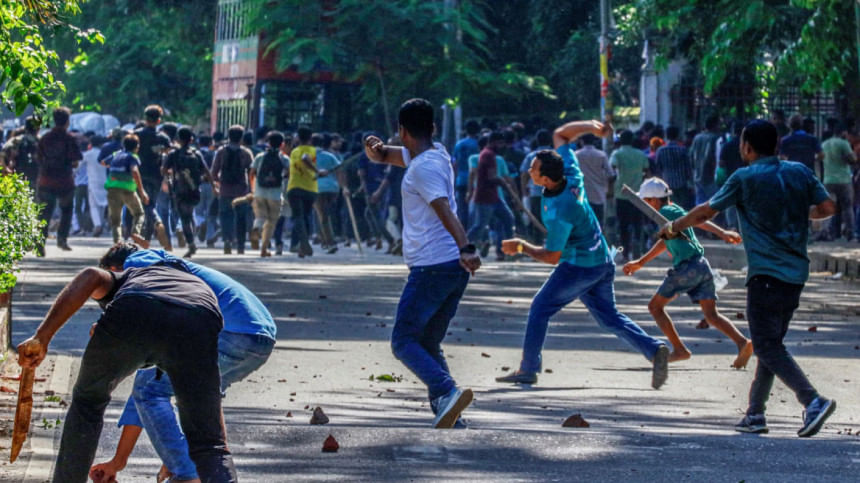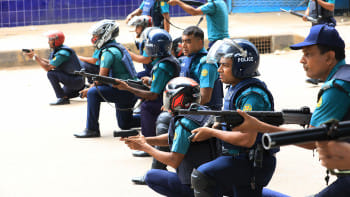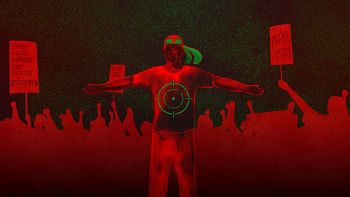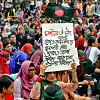Aftermath of quota reform violence: Will a normal day ever come?

After finishing her lunch, six-year-old Riya went to play on the rooftop of her family's home in Narayanganj. Tragically, her innocent moment was abruptly shattered when a bullet from a law enforcement raid struck her in the head. Similar tragedies have unfolded across Dhaka: four-year-old Ahad was shot while standing on his balcony with his parents, just as he was closing a window—everyday activities violently interrupted by the chaos of violence.
These incidents underscore how even the sanctuaries of home, like balconies and rooftops, are not immune to the reach of violence. This situation calls to mind the experiences shared by Bisan from Gaza, whose Instagram reels poignantly capture the mass-scale violence and disruption in Palestine.
Veena Das, a prominent anthropologist, offers profound insights into how violence permeates and affects everyday life. Her work emphasises that violence is not merely an event, but a process that deeply influences daily routines, relationships, and the broader social fabric.
Das explores the concept of "everyday violence," illustrating how acts of violence, whether state-sponsored or otherwise, are not isolated incidents, but rather deeply intertwined with the daily experiences of individuals and communities. In her studies, she highlights how violence can reshape the very essence of daily life, creating a climate of fear, insecurity, and disruption that affects everything from personal interactions to community cohesion.
The recent violence in Dhaka and the rest of the country has fostered an atmosphere of pervasive fear and insecurity. Students are increasingly subjected to raids, with many being rushed to hospitals with serious injuries. A recent report in The Daily Star highlighted the case of Mehedi, a student who was shot and injured. His father's poignant remark, "I will never tell anyone to send their kids to school again," captures the profound mistrust and anxiety that now pervade the community.
These incidents extend beyond temporary disruptions; they inflict lasting psychological scars. Veena Das's concept of "everyday violence" provides a framework for understanding this issue. She asserts that violence permeates the routine aspects of life, embedding fear deeply into the daily experience. The state's pervasive violence in Dhaka permeates the social fabric, eroding trust and safety. This atmosphere of fear significantly affects social interactions and community cohesion, making it increasingly difficult for people to feel secure in public spaces.
The frequent block raids and the mistreatment of individuals, exemplified by the unlawful arrest and brutal handling of 17-year-old Hasnatul Islam Fayaz, who was bound with ropes, intensify this sense of insecurity. Such actions inflict immediate harm and contribute to a broader climate of fear, destabilising the sense of safety and stability in everyday life.
My room that once served as a sanctuary of personal expression, marked by yellow curtains and cherished books, is now overshadowed by the omnipresent influence of the authorities. The incessant noise of helicopters and the constant use of sound grenades, purportedly for protection, pervade our private spaces. What were once havens of safety have become zones of fear and control. The enforced immobility, isolation due to internet shutdowns, and the unyielding noise disrupt the peace and safety of our homes. Conversations with friends reveal this unsettling reality: one struggles with the rising cost of living, another cannot sleep without leaving the door open, feeling trapped and vulnerable.
This transformation is not merely physical, but profoundly psychological. James C Scott's Seeing Like a State provides a useful framework for understanding this impact. Scott explains how states impose their vision of order and control on society, often disregarding the complexities of local contexts. The deployment of helicopters and the relentless use of sound grenades, framed as protective measures, exemplify how the authorities' control extends to personal spaces, turning them into extensions of their surveillance and power.
Reflecting on the idea of normalcy amid this reconfigured time and space, it becomes evident that both public and private spheres are profoundly affected by pervasive violence. A return to normalcy seems increasingly unattainable. As Das notes, there is a "mutual absorption of the violent and the ordinary" in such contexts, where violence intertwines with the everyday, anchoring the event to the ordinary in specific ways. This intersection underscores how acts of violence permeate and redefine the ordinary, embedding fear and instability into the fabric of daily life.
Acknowledging these impacts is crucial for moving forward. The community requires systemic change to restore safety and normalcy, ensuring that personal spaces retain their privacy and public spaces are free from fear and violence. The act of witnessing, therefore, becomes vital—not merely as an observation but as a way to understand and address the intertwining of violence and ordinary life, seeking to unravel the pervasive influence of government-imposed disruptions.
Will this trauma ever be cancelled? Can we envision a future where such pervasive violence and control are no longer defining elements of our daily lives? How do we move from this deeply fractured state of existence to a place where normalcy, safety, and privacy can be truly restored?
Shrobona Shafique Dipti is an independent researcher of urban anthropology.
Views expressed in this article are the auhtor's own.
Follow The Daily Star Opinion on Facebook for the latest opinions, commentaries and analyses by experts and professionals. To contribute your article or letter to The Daily Star Opinion, see our guideline for submission.

 For all latest news, follow The Daily Star's Google News channel.
For all latest news, follow The Daily Star's Google News channel. 










Comments